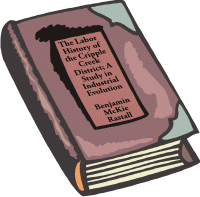 |
Victor
|
The Labor History of the Cripple Creek District;
A Study in Industrial Evolution
by Benjamin McKie Rastall

page 19
Indirect Causes Of Strike
The situation was further involved by irregularity in the hours of employment at the mines, and the variation in the working day.
The camp was new, and had not settled down to regular life as yet, and custom had not been given time to develop its unwritten law. Men had not begun to do things as they found other men doing them. When a new mine started up, its owner or manager relied entirely upon his own judgment as to how it could best be worked, and there naturally arose a great diversity. Some mines worked three shifts a day, some two shifts, some one. In some of the mines the men worked eight hours, in others nine, and in others ten. Among the principal mines working eight hours may be mentioned the Isabella, the Pharmacist, the Zenobia, and the Pike's Peak. The principal ten-hour mines were the Strong, Granite, Portland, and Independence; and the principal nine-hour mines the Victor, Anaconda, Sunset, C. 0. D., Gold King, and Ingraham. The wage at all the mines was uniformly three dollars per day, irrespective of the length of the shift.7
Here was a dangerous condition of affairs, one which must sooner or later result in trouble. It could only be a question of time until the men working in the long-time mines should awaken to the fact that their labor was as valuable as that of any other men, and demand as short a working day as the shortest; or until the mine owners of the short-time mines should discover that their money was as good as that of any other men, and demand as long a working day as the longest. Such unequal conditions could not long continue. Labor or capital would move presently, and under the economic conditions which we have just examined, with a large increase in the purchasing power of money, and thousands of men at hand ready to work for almost any wage, it is not hard to see from which source the movement was likely to come.
7The Portland mine which had a nine-hour day and $3.25 wage is an exception. President Calderwood estimates the number of men engaged in mining at the time as 1,200, about half employed in the eight-hour mines and half in the nine- and ten-hour mines.
NEXT: Events Leading Up To The Strike